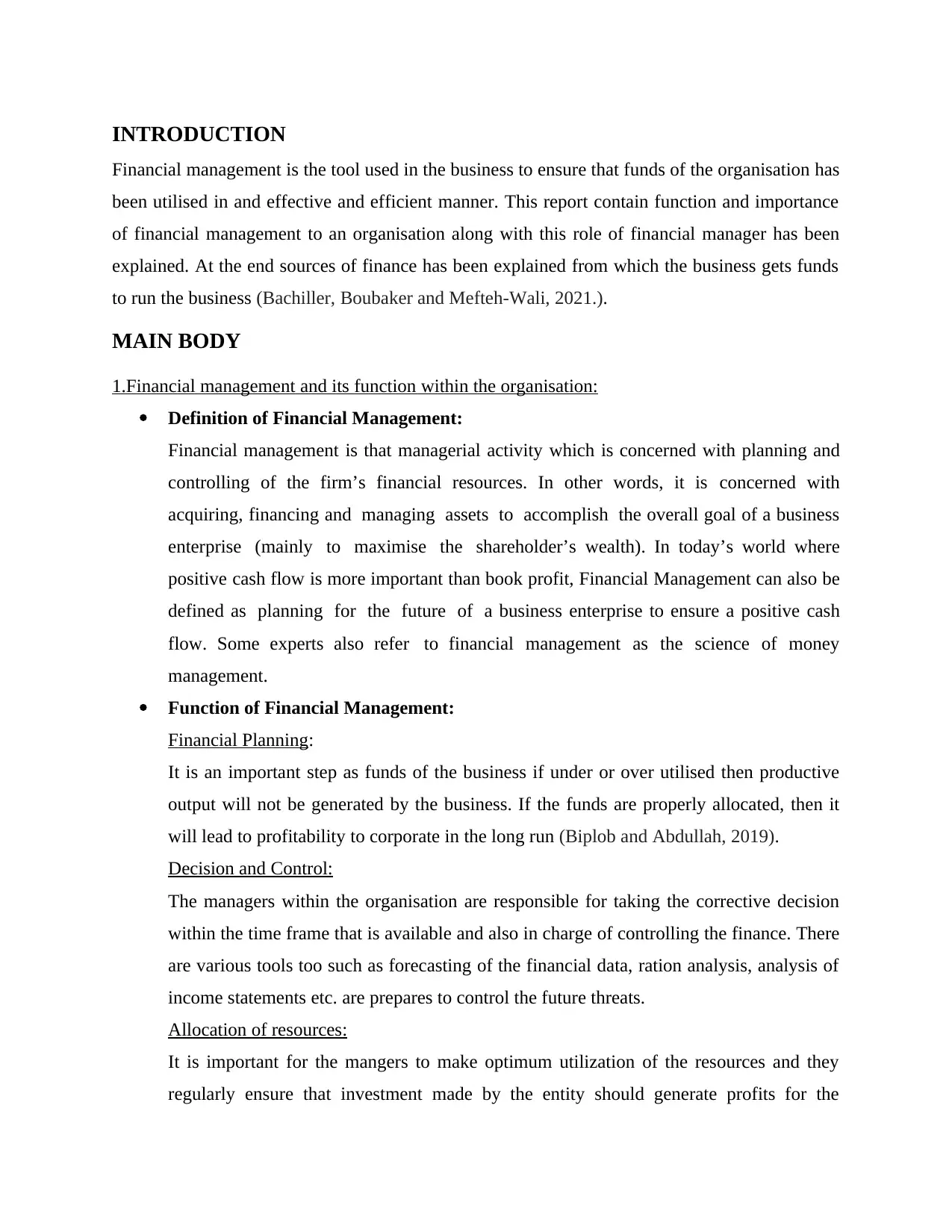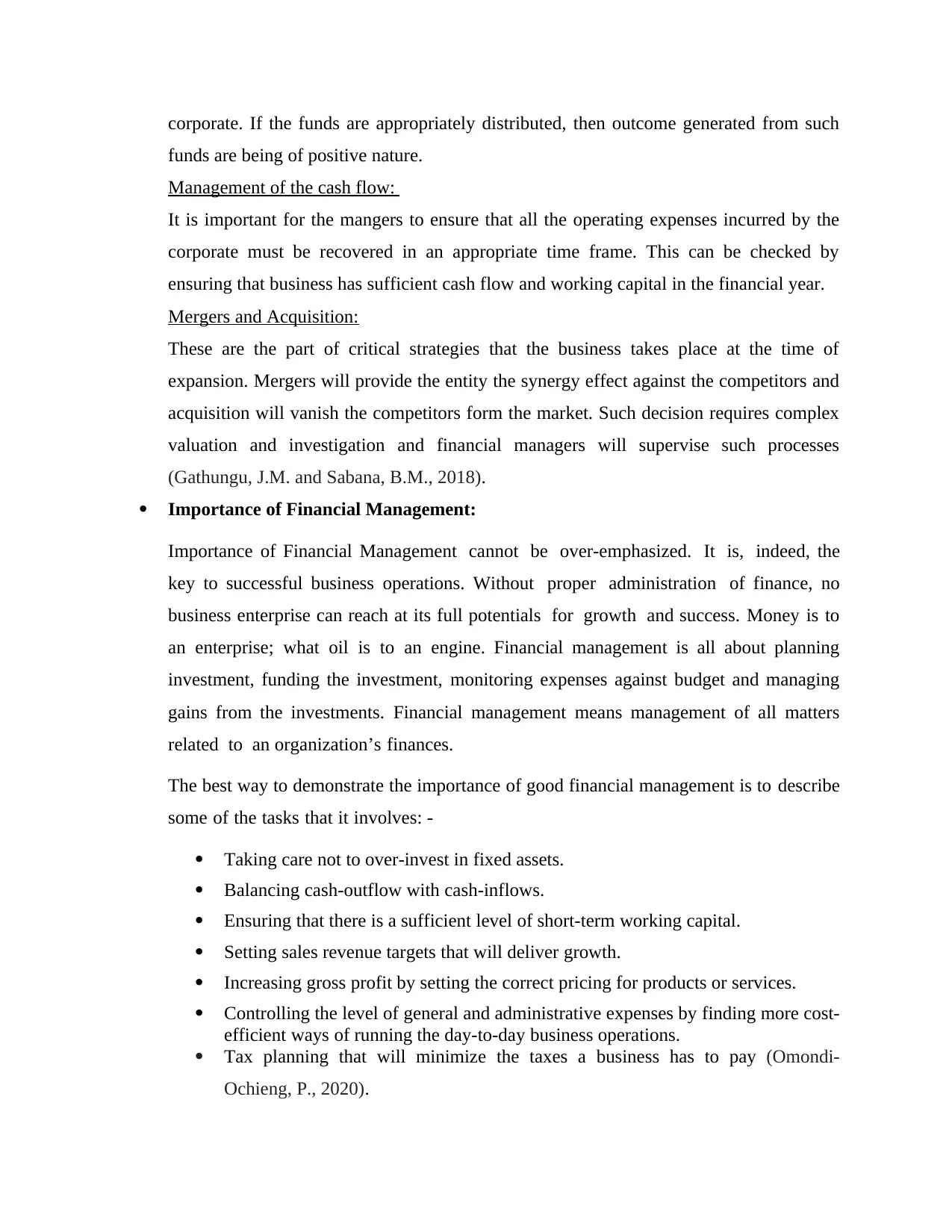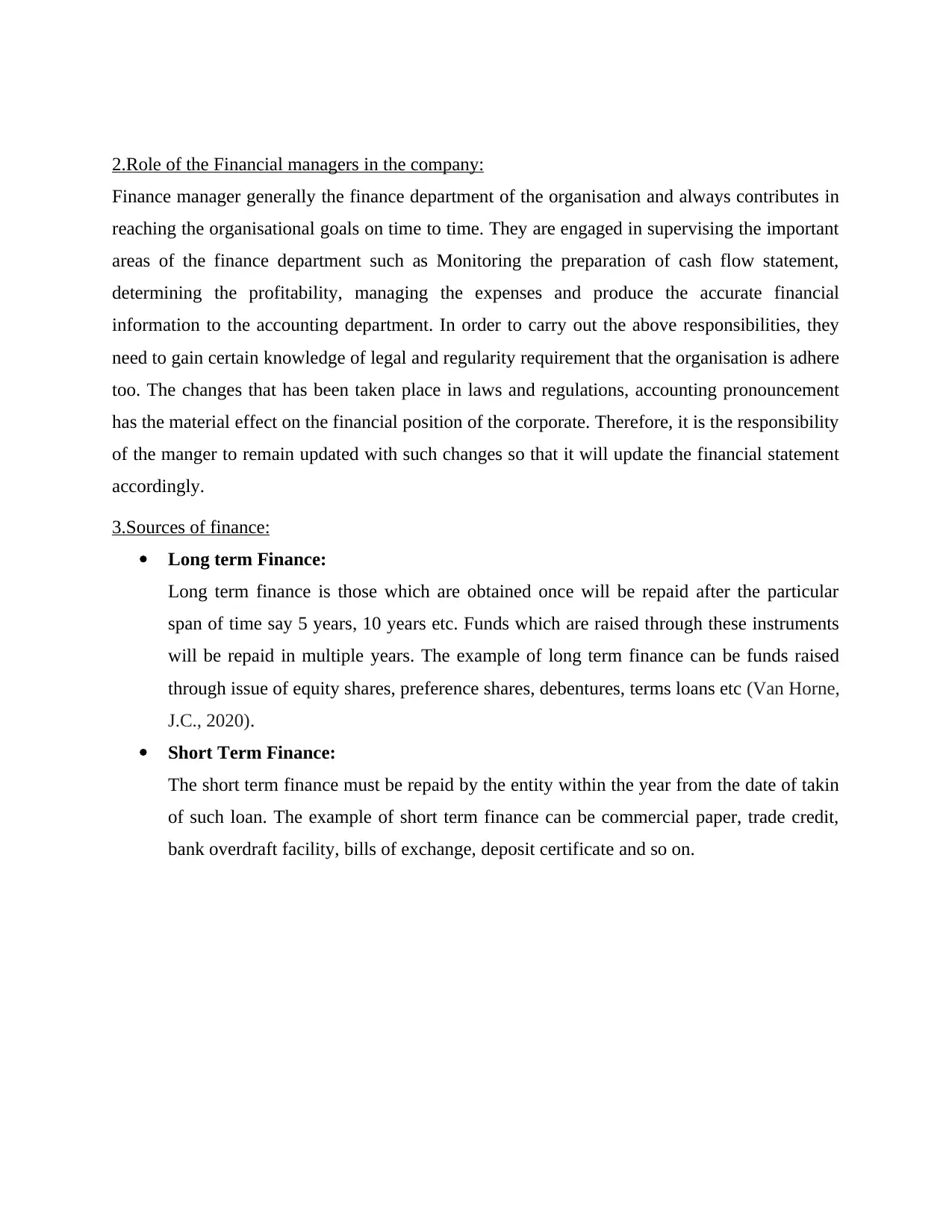Financial Management: Functions, Roles, and Sources of Finance
VerifiedAdded on 2023/06/11
|7
|1255
|227
Report
AI Summary
This report provides a comprehensive overview of financial management, defining it as a managerial activity focused on planning and controlling a firm's financial resources. It highlights the functions of financial management, including financial planning, decision making and control, resource allocation, cash flow management, and mergers and acquisitions. The report emphasizes the importance of financial management in ensuring successful business operations and maximizing shareholder wealth. Furthermore, it outlines the roles of financial managers in supervising financial statement preparation, determining profitability, and managing expenses, while staying updated with legal and regulatory requirements. Finally, the report details various sources of finance, differentiating between long-term finance options like equity shares and short-term finance options like commercial paper, highlighting their respective uses in business operations. Desklib offers a wide range of study resources, including past papers and solved assignments, to support students in their academic journey.

Financial Management
Paraphrase This Document
Need a fresh take? Get an instant paraphrase of this document with our AI Paraphraser

Contents
INTRODUCTION...........................................................................................................................3
MAIN BODY...................................................................................................................................3
1.Financial management and its function within the organisation:........................................3
2.Role of the Financial managers in the company:................................................................5
3.Sources of finance:..............................................................................................................5
CONCLUSION................................................................................................................................6
REFERENCES................................................................................................................................7
INTRODUCTION...........................................................................................................................3
MAIN BODY...................................................................................................................................3
1.Financial management and its function within the organisation:........................................3
2.Role of the Financial managers in the company:................................................................5
3.Sources of finance:..............................................................................................................5
CONCLUSION................................................................................................................................6
REFERENCES................................................................................................................................7

INTRODUCTION
Financial management is the tool used in the business to ensure that funds of the organisation has
been utilised in and effective and efficient manner. This report contain function and importance
of financial management to an organisation along with this role of financial manager has been
explained. At the end sources of finance has been explained from which the business gets funds
to run the business (Bachiller, Boubaker and Mefteh-Wali, 2021.).
MAIN BODY
1.Financial management and its function within the organisation:
Definition of Financial Management:
Financial management is that managerial activity which is concerned with planning and
controlling of the firm’s financial resources. In other words, it is concerned with
acquiring, financing and managing assets to accomplish the overall goal of a business
enterprise (mainly to maximise the shareholder’s wealth). In today’s world where
positive cash flow is more important than book profit, Financial Management can also be
defined as planning for the future of a business enterprise to ensure a positive cash
flow. Some experts also refer to financial management as the science of money
management.
Function of Financial Management:
Financial Planning:
It is an important step as funds of the business if under or over utilised then productive
output will not be generated by the business. If the funds are properly allocated, then it
will lead to profitability to corporate in the long run (Biplob and Abdullah, 2019).
Decision and Control:
The managers within the organisation are responsible for taking the corrective decision
within the time frame that is available and also in charge of controlling the finance. There
are various tools too such as forecasting of the financial data, ration analysis, analysis of
income statements etc. are prepares to control the future threats.
Allocation of resources:
It is important for the mangers to make optimum utilization of the resources and they
regularly ensure that investment made by the entity should generate profits for the
Financial management is the tool used in the business to ensure that funds of the organisation has
been utilised in and effective and efficient manner. This report contain function and importance
of financial management to an organisation along with this role of financial manager has been
explained. At the end sources of finance has been explained from which the business gets funds
to run the business (Bachiller, Boubaker and Mefteh-Wali, 2021.).
MAIN BODY
1.Financial management and its function within the organisation:
Definition of Financial Management:
Financial management is that managerial activity which is concerned with planning and
controlling of the firm’s financial resources. In other words, it is concerned with
acquiring, financing and managing assets to accomplish the overall goal of a business
enterprise (mainly to maximise the shareholder’s wealth). In today’s world where
positive cash flow is more important than book profit, Financial Management can also be
defined as planning for the future of a business enterprise to ensure a positive cash
flow. Some experts also refer to financial management as the science of money
management.
Function of Financial Management:
Financial Planning:
It is an important step as funds of the business if under or over utilised then productive
output will not be generated by the business. If the funds are properly allocated, then it
will lead to profitability to corporate in the long run (Biplob and Abdullah, 2019).
Decision and Control:
The managers within the organisation are responsible for taking the corrective decision
within the time frame that is available and also in charge of controlling the finance. There
are various tools too such as forecasting of the financial data, ration analysis, analysis of
income statements etc. are prepares to control the future threats.
Allocation of resources:
It is important for the mangers to make optimum utilization of the resources and they
regularly ensure that investment made by the entity should generate profits for the
⊘ This is a preview!⊘
Do you want full access?
Subscribe today to unlock all pages.

Trusted by 1+ million students worldwide

corporate. If the funds are appropriately distributed, then outcome generated from such
funds are being of positive nature.
Management of the cash flow:
It is important for the mangers to ensure that all the operating expenses incurred by the
corporate must be recovered in an appropriate time frame. This can be checked by
ensuring that business has sufficient cash flow and working capital in the financial year.
Mergers and Acquisition:
These are the part of critical strategies that the business takes place at the time of
expansion. Mergers will provide the entity the synergy effect against the competitors and
acquisition will vanish the competitors form the market. Such decision requires complex
valuation and investigation and financial managers will supervise such processes
(Gathungu, J.M. and Sabana, B.M., 2018).
Importance of Financial Management:
Importance of Financial Management cannot be over-emphasized. It is, indeed, the
key to successful business operations. Without proper administration of finance, no
business enterprise can reach at its full potentials for growth and success. Money is to
an enterprise; what oil is to an engine. Financial management is all about planning
investment, funding the investment, monitoring expenses against budget and managing
gains from the investments. Financial management means management of all matters
related to an organization’s finances.
The best way to demonstrate the importance of good financial management is to describe
some of the tasks that it involves: -
Taking care not to over-invest in fixed assets.
Balancing cash-outflow with cash-inflows.
Ensuring that there is a sufficient level of short-term working capital.
Setting sales revenue targets that will deliver growth.
Increasing gross profit by setting the correct pricing for products or services.
Controlling the level of general and administrative expenses by finding more cost-
efficient ways of running the day-to-day business operations.
Tax planning that will minimize the taxes a business has to pay (Omondi-
Ochieng, P., 2020).
funds are being of positive nature.
Management of the cash flow:
It is important for the mangers to ensure that all the operating expenses incurred by the
corporate must be recovered in an appropriate time frame. This can be checked by
ensuring that business has sufficient cash flow and working capital in the financial year.
Mergers and Acquisition:
These are the part of critical strategies that the business takes place at the time of
expansion. Mergers will provide the entity the synergy effect against the competitors and
acquisition will vanish the competitors form the market. Such decision requires complex
valuation and investigation and financial managers will supervise such processes
(Gathungu, J.M. and Sabana, B.M., 2018).
Importance of Financial Management:
Importance of Financial Management cannot be over-emphasized. It is, indeed, the
key to successful business operations. Without proper administration of finance, no
business enterprise can reach at its full potentials for growth and success. Money is to
an enterprise; what oil is to an engine. Financial management is all about planning
investment, funding the investment, monitoring expenses against budget and managing
gains from the investments. Financial management means management of all matters
related to an organization’s finances.
The best way to demonstrate the importance of good financial management is to describe
some of the tasks that it involves: -
Taking care not to over-invest in fixed assets.
Balancing cash-outflow with cash-inflows.
Ensuring that there is a sufficient level of short-term working capital.
Setting sales revenue targets that will deliver growth.
Increasing gross profit by setting the correct pricing for products or services.
Controlling the level of general and administrative expenses by finding more cost-
efficient ways of running the day-to-day business operations.
Tax planning that will minimize the taxes a business has to pay (Omondi-
Ochieng, P., 2020).
Paraphrase This Document
Need a fresh take? Get an instant paraphrase of this document with our AI Paraphraser

2.Role of the Financial managers in the company:
Finance manager generally the finance department of the organisation and always contributes in
reaching the organisational goals on time to time. They are engaged in supervising the important
areas of the finance department such as Monitoring the preparation of cash flow statement,
determining the profitability, managing the expenses and produce the accurate financial
information to the accounting department. In order to carry out the above responsibilities, they
need to gain certain knowledge of legal and regularity requirement that the organisation is adhere
too. The changes that has been taken place in laws and regulations, accounting pronouncement
has the material effect on the financial position of the corporate. Therefore, it is the responsibility
of the manger to remain updated with such changes so that it will update the financial statement
accordingly.
3.Sources of finance:
Long term Finance:
Long term finance is those which are obtained once will be repaid after the particular
span of time say 5 years, 10 years etc. Funds which are raised through these instruments
will be repaid in multiple years. The example of long term finance can be funds raised
through issue of equity shares, preference shares, debentures, terms loans etc (Van Horne,
J.C., 2020).
Short Term Finance:
The short term finance must be repaid by the entity within the year from the date of takin
of such loan. The example of short term finance can be commercial paper, trade credit,
bank overdraft facility, bills of exchange, deposit certificate and so on.
Finance manager generally the finance department of the organisation and always contributes in
reaching the organisational goals on time to time. They are engaged in supervising the important
areas of the finance department such as Monitoring the preparation of cash flow statement,
determining the profitability, managing the expenses and produce the accurate financial
information to the accounting department. In order to carry out the above responsibilities, they
need to gain certain knowledge of legal and regularity requirement that the organisation is adhere
too. The changes that has been taken place in laws and regulations, accounting pronouncement
has the material effect on the financial position of the corporate. Therefore, it is the responsibility
of the manger to remain updated with such changes so that it will update the financial statement
accordingly.
3.Sources of finance:
Long term Finance:
Long term finance is those which are obtained once will be repaid after the particular
span of time say 5 years, 10 years etc. Funds which are raised through these instruments
will be repaid in multiple years. The example of long term finance can be funds raised
through issue of equity shares, preference shares, debentures, terms loans etc (Van Horne,
J.C., 2020).
Short Term Finance:
The short term finance must be repaid by the entity within the year from the date of takin
of such loan. The example of short term finance can be commercial paper, trade credit,
bank overdraft facility, bills of exchange, deposit certificate and so on.

CONCLUSION
This report highlights the definition of financial management and its function for an organisation.
This statement provides the role that the finance mangers plays within the organisation. Every
business required funds to run their business and such funds are described above that can be
short term or long term depending upon the needs of the company.
This report highlights the definition of financial management and its function for an organisation.
This statement provides the role that the finance mangers plays within the organisation. Every
business required funds to run their business and such funds are described above that can be
short term or long term depending upon the needs of the company.
⊘ This is a preview!⊘
Do you want full access?
Subscribe today to unlock all pages.

Trusted by 1+ million students worldwide

REFERENCES
Books and Journals
Bachiller, P., Boubaker, S. and Mefteh-Wali, S., 2021. Financial derivatives and firm value:
What have we learned? Finance Research Letters. 39. p.101573.
Biplob, H. and Abdullah, M., 2019. The importance of islamic financial literacy for muslims: a
general review. Islam & Civilisational Renewal. 10(1).
Gathungu, J.M. and Sabana, B.M., 2018. Entrepreneur financial literacy, financial access,
transaction costs and performance of microenterprises in Nairobi City County in
Kenya. Global Journal of Management and Business Research.
Omondi-Ochieng, P., 2020. Financial performance of the United Kingdom's national non-profit
sport federations: A binary logistic regression approach. Managerial Finance.
Van Horne, J.C., 2020. Fundamentals of financial management.
Books and Journals
Bachiller, P., Boubaker, S. and Mefteh-Wali, S., 2021. Financial derivatives and firm value:
What have we learned? Finance Research Letters. 39. p.101573.
Biplob, H. and Abdullah, M., 2019. The importance of islamic financial literacy for muslims: a
general review. Islam & Civilisational Renewal. 10(1).
Gathungu, J.M. and Sabana, B.M., 2018. Entrepreneur financial literacy, financial access,
transaction costs and performance of microenterprises in Nairobi City County in
Kenya. Global Journal of Management and Business Research.
Omondi-Ochieng, P., 2020. Financial performance of the United Kingdom's national non-profit
sport federations: A binary logistic regression approach. Managerial Finance.
Van Horne, J.C., 2020. Fundamentals of financial management.
1 out of 7
Related Documents
Your All-in-One AI-Powered Toolkit for Academic Success.
+13062052269
info@desklib.com
Available 24*7 on WhatsApp / Email
![[object Object]](/_next/static/media/star-bottom.7253800d.svg)
Unlock your academic potential
Copyright © 2020–2026 A2Z Services. All Rights Reserved. Developed and managed by ZUCOL.





